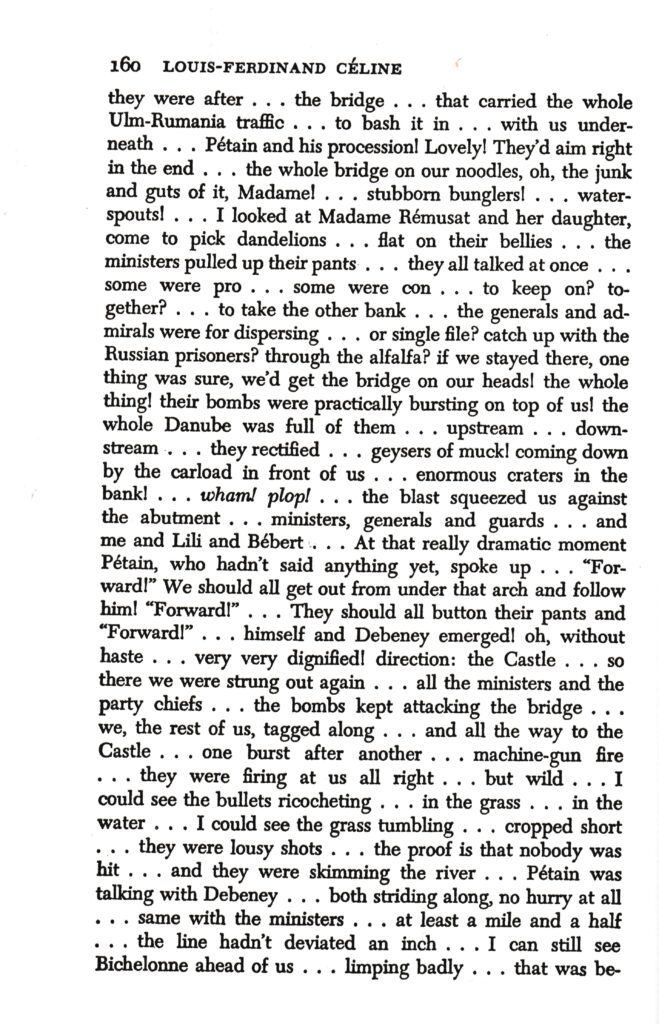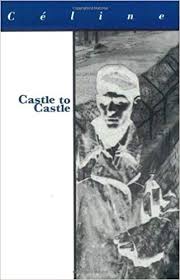GoodReads meta-data is 362 pages, rated 3.81 by 997 litizens.
Genre: Autobiography.
Verdict: ….ellipses…, indeed!

In a southeast corner of Bavaria is the small town (population 17,000 in 2018) of Sigmaringen, which had been the seat of the principality of Hohenzollern-Sigmaringen until 1850, there is a castle befitting that status. The town has since remained the personal property of the Hohenzollern family. Fascinating, uh?
In September 1944 the castle became home to the remnant of the Vichy government in exile, one of the more bizarre twists of fate in World War II. More than a thousand people, including Maréchal Phillip Pétain, President of the council of the Vichy government and his prime minister, Fernand de Brinon were trucked out of Vichy and ensconced in and around that Hohenzollern Castle at Sigmaringen. The others were Vichy loyalists, officials, army officers, clerks, ministers, telephonists, typists, janitors, archivists, aides, butlers, factotums, secretaries, churchmen, sycophants, diplomats, hangers-on, however, initially there were few of the French fascist zealots from Paris who were left to fend for themselves. Along with the loyalists went their families and retainers. This castle would qualify as an Old Dark House with dungeons, hidden doors, spy holes, caves, secret passages, bricked up passage ways, concealed rooms, and the ghosts of Hohenzollerns past. In residence was the last Hohenzollern princess who occasionally appeared from her private apartment.
This crew was officially known as – get this – first as la Commission gouvernementale de Sigmaringen, which was changed a few days later to la Délégation gouvernementale française pour la défense des intérêts français en Allemagne, and then la Commission gouvernementale française pour la défense des intérêts nationaux. Even in 1944, even in extremis managers reorganise and rename to justify their existence, it would seem. Whatever the nomenclature, it was the government in exile of Vichy France until April 1945. By a personal order from Hitler, the Castle and its environs were designated a French enclave ruled by the aforementioned government in exile.
Now why Hitler would bother with this lot is another question, perhaps for Indy Neidell one day. Hitler had rescued Mussolini and set him up with a rump government at Salo, yes, true, but that made some sense in that the Salo government kept order in northern Italy behind German lines. The Sigmaringen government had nothing to order but itself for the seven months of its tenuous existence. One speculation is that the Vichy Government, house of cards though it was, was kept intact so that should the the tide of war change it could be quickly re-installed. Chalk that up to optimism.
Neither Pétain nor Pierre Laval, for though deposed as prime minister the latter remained a power behind the throne, or so he thought, wanted to leave France, though what their fate would be if they remained requires no imagination, yet possibly both these men were so deluded they alone would have been surprised by the lynch mob. The solution was to make the enclave French territory on the model of an embassy. This German legal fiction was grudgingly accepted by the Vichy loyalists. Hence both Laval and Pétain could say they had not left French territory while in that castle in Germany. Look up legal fiction for details.
Meanwhile, some of those zealots who had fled from Paris joined the group. This was not a homogeneous lot. The zealots from Paris had long criticised the Vichy government for its sloth, incompetence, semitism, fashion sense, defeatism, and lack of commitment to the cause of fascism, failure to retain the French Empire, and poor grammar. Parisien leaders of factions, cults, and publicists put themselves forward at this eleventh and dark hour as alternative governments to the Germans in this city-state of one thousand damned souls. These rivalries are partly reflected in the name changes noted above, as the splinter groups of a few dozen jockeyed for position. The Germans had no interest in rocking the already sinking boat and stuck with the Vichy comedy.
Among the number in the castle were the medical doctor and novelist Céline, Lucette, his wife, and Bébert, their cat, and later in 1957 desperate to make a living, he penned this screed about those dying days. It consists of his well known ellipses in stream of consciousness. It seems to this reader it was published only because it had Céline’s name on it. After the war he had been judged a traitor and suffered national denigration for his collaboration. That denigration meant he was excluded from social services and even could not ride public transport. To see a doctor, to buy a metro ticket in those days one had to show the carte d’identité, and his card was marked. But he had been a celebrated novelist and his postwar notoriety, perhaps, added to the caché of the book, or so the publisher may have estimated.

The Vichy French flag flew over the Castle, a newspaper of sorts was produced, a radio station was set up but seldom had enough electricity to broadcast, and some other accoutrements of a state, like – believe it or not – postage stamps were designed. The file clerks filed; the typists typed; the factotums factoted. There were also three foreign ambassadors in attendance, Italian, Japanese, and German. And it had its own army, a gang of the dreaded Milice. However, the aged Maréchal, who was well over eighty years old by this time, went into a sulk and refused to participate in this last charade.
Food was scarce, aerial bombardment an ever-present threat, drinking water often contaminated, the German-uniformed (mostly Croat) guards were warders who made sure none of their charges left, and they, too, were anxious. The more desperate the circumstances the more the exiles turned on each other. Leading the way, Céline shrilly denouncing them all as Jews.
News of the Christmas Nazi Ardennes offensive, rumours of Nazi secret weapons all gave hope to these desperate and despicable people, but the reality of no food, no paper, no wine, no soap, no fuel for heat, no hot water, no drugs, no clean bandages, no socks, no thread to mend ripped clothing, no nothing was crushing.
As Free French forces approached, Pétain and Laval and few others in their retinue fled into Switzerland. (Some sources say the French Free army was slowed to allow the inmates to escape as the Free French had no desire to deal with them.) Once in Switzerland Pétain demanded that he be returned to France and he was, while Laval demanded asylum in Switzerland which was denied and he, too, was returned to France. Meanwhile back at the castle the German-Croat guards disappeared as the Free French rolled in and bagged the remainder, though in the confusion a few individuals escaped to Italy.
The book is sprinkled with hindsight and it was all written well after the fact. Céline did not keep a diary, though he did practice medicine among the exiles and kept notes for that.
It is a story reminiscent of that other, smaller castle crew at Château Itter (Austria) where from 1940 the Germans held as hostages to fortune French officials of the Third Republic. Among them were former prime ministers Éduoard Daladier, who had sat in a numb silence at Munich, and Paul Reynaud, who in 1940 had wanted to continue the fight from Algeria, former Vichy cabinet minister Jean Borotera who resisted Vichy’s anti-semitism, and Generals Maurice Gamelin and Maxime Weygand, along with politicians Andre François-Poncet, Michel Clemenceau, and Albert Lebrun, as well as one of Charles de Gaulle’s sisters, and a few others totalling perhaps thirty. LeBrun had been the President of the Senate who had authorised Pétain to sound out the Germans about terms and was then surprised when Pétain used the commission to surrender without attempting negotiation.
There would have been no love lost among these people. Gamelin and Weygand were each at work on memoirs blaming the other for the Defeat, as were Daladier and Reynaud. Léon Blum, another one-time prime minister was not here, because Vichy officials had in mind a show trial to blame him for anything and everything, and kept him apart. The Itter was liberated in late 1944.
But let’s not forget that the most significant hostages to fortune that the Nazis had, namely, a million plus French prisoners of war, working as slave labor in German war industries and on farms. In addition to these unfortunates, there were also as many as another million French citizens sent to Germany as forced labor by the Service du Travail Obligatoire (STO). The Vichy Regime made little effort to secure the release of the POWs or to stymie the STO. Indeed, as to the latter, sometimes it sent more conscripts than ordered by the Nazis to show how enthusiastic it was. In addition the production of millions of others in France was harvested and sent to Germany.
N.B. In 1941 the Vichy Regime did try to negotiate a return of prisoners by offering German unlimited access to Syria and Lebanon. This was attractive to Germany as a threat both to the Suez Canal and the Iraq oil fields. It took the Allied conquest of the Levant (in which Australians participated) to block that move. NSW Governor Roden Cutler had his leg shot off there.

